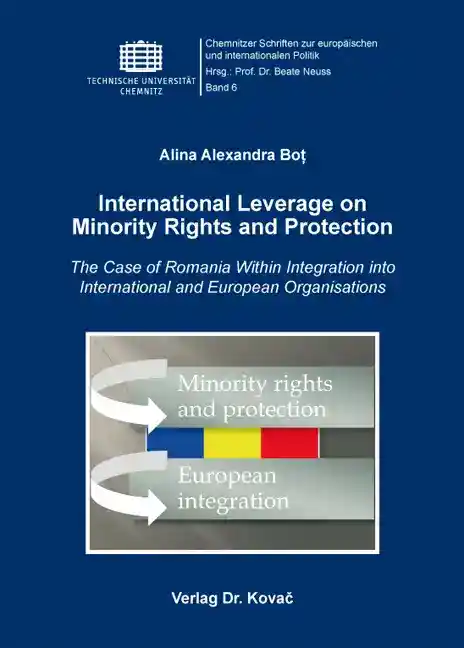Alina Alexandra BotInternational Leverage on Minority Rights and Protection
The Case of Romania Within Integration into International and European Organisations
Chemnitzer Schriften zur europäischen und internationalen Politik, volume 6
Hamburg 2013, 494 pages
ISBN 978-3-8300-7175-4 (print) |ISBN 978-3-339-07175-0 (eBook)
Rezension
[...] erweist sich der rationalistische Analyseansatz als klug gewählt, um auch die Motivation der Akteure zur Akzeptanz gegenüber der Konditionalität des EU‑Regelwerks berücksichtigen zu können, das an allgemein anerkannte völkerrechtliche Normen und Standards anknüpft.
[...] Die vielleicht wichtigste Erkenntnis der Arbeit ist die Tatsache, dass die EU die Minderheitenrechte nunmehr im Rahmen des Beitritts sanktionieren und ihnen im Rahmen der Konditionalität so mehr Gewicht verleihen kann.
About this book deutschenglish
After the fall of the dictatorial regime in Romania, the country had to align its legislation and policies to international and European norms in the quest to achieve what popular understanding encompassed in the slogan “Return to Europe”. To that aim Romania had both to consolidate its position in international organizations it was a member of, such as the United Nations and the OSCE, but more importantly, it had to gain membership to main European organizations, namely to the Council of Europe and ultimately to the European Union. The book examines the complex path Romania had to follow in the specific field of minority rights and protection. The scarcity of accepted standards and continuously evolving mechanisms with normative, monitoring and enforcing powers at international level rendered the challenge Romania was faced with even more intricate. The book bridges a gap in the existing literature on minority rights and protection in Romania and on Romania's adhesion to and integration into main international and European organizations by testing the hypothesis according to which minority-related areas have only developed at domestic level as a direct result of the EU's Copenhagen political conditionality. The choice for the research topic is justified by the neo-realist and institutionalist divide regarding the importance organizations have in driving changes in state behavior. The book is tributary to two main schools of thought regarding the amount of leverage organizations have in shaping domestic policies of candidate countries. The first is codified empirically by the rationalist approach of the “external incentives model” based on cost-benefit relations. The second direction challenges the very idea of conditionality as a given variable and advances a more flexible approach, according to which conditionality was not a pre-established construct, but a politicized and continuously evolving process, shaped by an open-ended list of actors. The book shows that in the case of Romania, conditionality in the field of minority rights and protection had a mixed record.
Keywords
Europäische IntegrationEuropäische UnionEuroparatIntegration von MinoritätenInternationale PolitikInternationaler EinflussKonfliktdeeskalationKonfliktpräventionMinderheitenrechteMinderheitenschutzOSZERumänienUNOIhr Werk im Verlag Dr. Kovač

Möchten Sie Ihre wissenschaftliche Arbeit publizieren? Erfahren Sie mehr über unsere günstigen Konditionen und unseren Service für Autorinnen und Autoren.
